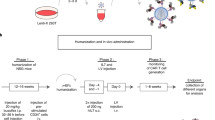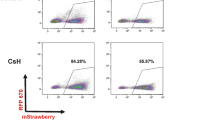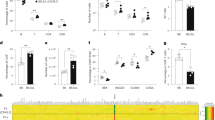Abstract
We investigated the delivery of a donor-specific MHC class I gene, H-2Kb, using a newly constructed replication-defective recombinant adenovirus (AdSV40Kb) to recipient tissue before transplantation as a means of inducing donor-specific immunological unresponsiveness. AdSV40Kb was able to transduce both a fibroblast cell line and freshly isolated bone marrow cells (BMCs) resulting in cell surface expression of H2-Kb protein. Intravenous infusion of AdSV40Kb-transduced syngeneic CBA/Ca (H-2k) BMCs into CBA recipient mice treated with an anti-CD4 monoclonal antibody 27 days before transplantation of a fully MHC-mismatched, C57BL/10 (H-2Kb+), cardiac allograft resulted in significant long-term graft survival when compared with mice receiving the same dose of syngeneic BMCs transduced with a control adenovirus, AdRSVβgal. Despite the induction of H-2Kb-specific hyporesponsiveness following pretreatment with AdSV40Kb-transduced CBA BMCs, persistence of H-2Kb mRNA in central or peripheral tissues could not be demonstrated by RT-PCR. This result was in contrast to the observed persistence of Kb mRNA both in the periphery and thymus following the infusion of transgenic CBK (H-2k + Kb) BMCs. We conclude that ex vivo adenoviral gene transfer of a single donor MHC class I gene to recipient BMCs in combination with transient depletion of CD4+ cells is sufficient to induce long-term graft survival of a fully allogeneic cardiac graft. In addition, detectable microchimerism is not a prerequisite for graft survival.
This is a preview of subscription content, access via your institution
Access options
Subscribe to this journal
Receive 12 print issues and online access
$259.00 per year
only $21.58 per issue
Buy this article
- Purchase on Springer Link
- Instant access to full article PDF
Prices may be subject to local taxes which are calculated during checkout



Similar content being viewed by others
References
Billingham R.E., Brent L., Medawar P.B. . Actively acquired tolerance of foreign cells Nature 1953 172: 603 603
Morris P.J. . Transplantation Delves PJ, Roitt IM (eds); Encyclopaedia of Immunology Academic Press 1997 pp 2411–2415
Madsen J.C., Superina R.A., Wood K.J., Morris P.J. . Immunological unresponsiveness induced by recipient cells transfected with donor MHC genes Nature 1988 332: 161 161
Wong W., Morris P.J., Wood K.J. . Syngeneic bone marrow expressing a single donor class I MHC molecule permits acceptance of a fully allogeneic cardiac allograft Transplantation 1996 62: 1462 1462
Sykes M. et al. Specific prolongation of skin graft survival following retroviral transduction of bone marrow with an allogeneic major histocompatibility complex gene Transplantation 1993 55: 197 197
Wong W., Stranford S.A., Morris P.J., Wood K.J. . Retroviral gene transfer of a donor class I MHC gene to recipient bone marrow cells induces tolerance to alloantigens in vivo Transplant Proc 1997 29: 1130 1130
Mayfield R.S. et al. The mechanism of specific prolongation of class I-mismatched skin grafts induced by retroviral gene therapy Eur J Immunol 1997 27: 1177 1177
Sonntag K.C. et al. Tolerance to solid organ transplants through transfer of MHC class II genes J Clin Invest 2001 107: 65 65
Kozarsky K.F., Wilson J.M. . Gene therapy: adenovirus vectors Curr Opin Genet Dev 1993 3: 499 499
Dai Y. et al. Cellular and humoral immune responses to adenoviral vectors containing factor IX gene: tolerization of factor IX and vector antigens allows for long-term expression Proc Natl Acad Sci USA 1995 92: 1401 1401
Wong W., Morris P.J., Wood K.J. . Pretransplant administration of a single donor class I major histocompatibility complex molecule is sufficient for the indefinite survival of fully allogeneic allografts: evidence for linked epitope suppression Transplantation 1997 63: 1490 1490
Laneuville P. et al. High-efficiency gene transfer and expression in normal human hematopoietic cells with retrovirus vectors Blood 1988 71: 811 811
Harrison D.E., Lerner C.P. . Most primitive hematopoietic stem cells are stimulated to cycle rapidly after treatment with 5-fluorouracil Blood 1991 78: 1237 1237
Bergelson J.M. et al. Isolation of a common receptor for Coxsackie B viruses and adenoviruses 2 and 5 Science 1997 275: 1320 1320
Watanabe T. et al. Gene transfer into human bone marrow hematopoietic cells mediated by adenovirus vectors Blood 1996 87: 5032 5032
Ko S. et al. The functional relevance of passenger leukocytes and microchimerism for heart allograft acceptance in the rat Nat Med 1999 5: 1292 1292
Bushell A., Pearson T.C., Morris P.J., Wood K.J. . Donor–recipient microchimerism is not required for tolerance induction following recipient pretreatment with donor-specific transfusion and anti-CD4 antibody. Evidence of a clear role for short-term antigen persistence Transplantation 1995 59: 1367 1367
Hamano K. et al. Evidence that the continued presence of the organ graft and not peripheral donor microchimerism is essential for maintenance of tolerance to alloantigen in vivo in anti-CD4 treated recipients Transplantation 1996 62: 856 856
Shirwan H., Wang C., Barwari L., Cramer D.V. . Recipient-donor microchimerism is not a prerequisite for the maintenance of allograft tolerance Transplant Proc 1997 29: 1182 1182
Bushell A., Morris P.J., Wood K.J. . Transplantation tolerance induced by antigen pretreatment and depleting anti-CD4 antibody depends on CD4+ T cell regulation during the induction phase of the response Eur J Immunol 1995 25: 2643 2643
Bushell A., Niimi M., Morris P.J., Wood K.J. . Evidence for immune regulation in the induction of transplantation tolerance: a conditional but limited role for IL4 J Immunol 1999 162: 1359 1359
Hara M. et al. IL-10 is required for regulatory T cells to mediate tolerance to alloantigens in vivo J Immunol 2001 166: 3789 3789
Auphan N. et al. The degree of CD8 dependence of cytolytic T cell precursors is determined by the nature of the T cell receptor (TCR) and influences negative selection in TCR-transgenic mice Eur J Immunol 1994 24: 1572 1572
McGrory W.J., Bautista D.S., Graham F.L. . A simple technique for the rescue of early region I mutations into infectious human adenovirus type 5 Virology 1988 163: 614 614
Byrnes A.P., Rusby J.E., Wood M.J., Charlton H.M. . Adenovirus gene transfer causes inflammation in the brain Neuroscience 1995 66: 1015 1015
Byrnes A.P., Rusby J.E., Wood M.J., Charlton H.M. . Adenovirus gene transfer causes inflammation in the brain
Stranford SA, Morris PJ, Wood KJ. Induction of specific unresponsiveness to alloantigen in mice via administration of a retroviral vector encoding a single allogeneic MHC class I gene. Basic Sci Symp Transplant Soc 1995; 0–33 Eur J Immunol 1987 17: 1159 1159
Ohmoto Y. et al. Variation in the immune response to adenoviral vectors in the brain: influence of mouse strain environmental conditions and priming Gene Therapy 1999 6: 471 471
Acknowledgements
This work was supported by the Wellcome Trust, The Medical Research Council of the United Kingdom and the European Union. The authors would like to thank Marco-Antonio Reis e Moura for technical assistance with the cardiac transplantation.
Author information
Authors and Affiliations
Rights and permissions
About this article
Cite this article
Fry, J., Morris, P. & Wood, K. Adenoviral transfer of a single donor-specific MHC class I gene to recipient bone marrow cells can induce specific immunological unresponsiveness in vivo. Gene Ther 9, 220–226 (2002). https://doi.org/10.1038/sj.gt.3301648
Received:
Accepted:
Published:
Issue Date:
DOI: https://doi.org/10.1038/sj.gt.3301648



